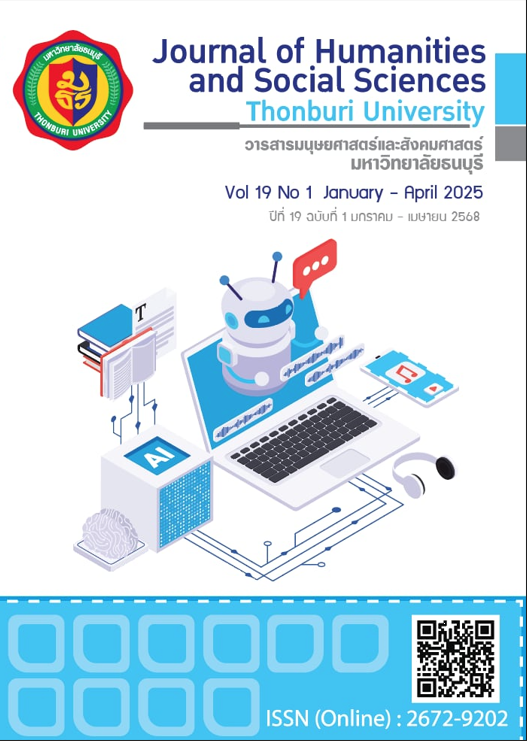Earnings Management under Political Crisis in Thailand
Keywords:
Political Crisis, Earnings Management, Political Uncertainty, Stock Exchange of ThailandAbstract
This research aims to study the relationship between political crisis and earnings management of companies listed on the Stock Exchange of Thailand. The political crisis in this context refer to the two coup events that occurred in Thailand. The sample group of this research consists of companies listed on the stock exchanges of four countries: Thailand, Indonesia, South Korea and the Philippines. This research uses the method differences-in-difference to test the differences between two samples groups: the treatment group and the control group, before and after the political crisis. The research findings indicate that the impact of crisis leading to political crisis, such as the coup in Thailand, prompted executives to engage in earnings management in order to achieve their predefined objectives. Additionally, the study found that the severity of political crisis is correlated with the level of earnings manipulation. Specifically, when the political crisis is more severe, company executives are more likely to engage in earnings manipulation, whereas when the crisis is less severe, the likelihood of such behavior decreases.
References
ธนาคารแห่งประเทศไทย. (2557). ประเด็นเศรษฐกิจในรอบปี 2557. สืบค้นเมื่อ 10 มกราคม 2567, จาก www.bot.or.th/content/dam/bot/documents/th/thai-economy/state-of-thai-economy/annual-report/annual-econ-report-th-2557.pdf
พงษ์ศักดิ์ เหลืองอร่าม และยุทธนา เศรษฐปราโมทย์. (2561). ต้นทุนทางเศรษฐกิจของความไม่แน่นอนทางการเมืองในประเทศไทย. สืบค้นเมื่อ 14 ตุลาคม 2566, จาก www.pier.or.th/files/dp/pier_dp_086.pdf
สมชาย สุภัทรกุล. (2548). แรงจูงใจในการตกแต่งกำไรเพื่อบรรลุเป้าหมายกำไร. TBS on corporate governance-การกำกับดูแลกิจการที่ดี. กรุงเทพฯ: คณะพาณิชยศาสตร์และการบัญชี มหาวิทยาลัยธรรมศาสตร์.
สำนักงานเลขาธิการสภาผู้แทนราษฎร. (2550). การรัฐประหารในประเทศไทย. กรุงเทพฯ: สำนักงานเลขาธิการสภาผู้แทนราษฎร.
สำนักงานสภาพัฒนาการเศรษฐกิจและสังคมแห่งชาติ. (2557). ภาวะเศรษฐกิจไทยไตรมาสที่สี่ ทั้งปี 2557 และแนวโน้มปี 2558. สืบค้นเมื่อ 15 มกราคม 2567, จาก www.nesdc.go.th/article_attach/PressThaiQ4-2014.pdf
Alhadab, M. Clacher, I., and Keasey, K. (2016). A comparative analysis of real and accrual earnings management around initial public offerings under different regulatory environments. Journal of Business Finance & Accounting. 43(7-8), 849-871.
Balima, H. W. (2020). Coups d’etat and the cost of debt. Journal of Comparative Economics. 48(3), 509-528.
Burgstahler, D. C. Hail, L., and Leuz, C. (2006). The importance of reporting incentives: earnings management in European private and public firms. The Accounting Review. 81(5), 983-1016.
Byard, D. Hossain, M., and Mitra, S. (2007). US oil companies’ earnings management in response to Hurricanes Katrina and Rita. The Journal of Accounting and Public Policy. 26(6), 733-748.
Chen, F. Hope, O. Li, Q., and Wang, X. (2017). Fight to Quality in International Market: Investors’ Demand for Financial Reporting Quality during Political Uncertainty Events. Contemporary Accounting Research. 35(1), 117-155.
Cohen, D. A. Dey, A., and Lys, T. Z. (2008). Real and accrual-based earnings management in the pre- and post-Sarbanes-Oxley periods. The Accounting Review. 83(3), 757-787.
Cohen, D. A., and Zarowin, P. (2010). Accrual-based and real earnings management activities around seasoned equity offerings. Journal of Accounting and Economics. 50(1), 2-19.
Healy, P. M., and Wahlen. J. M. (1999). A Review of the Earnings Management Literature and its Implications for Standard Setting. Accounting Horizons. 13(4), 365-383.
Hribar, P., and Collines. D. W. (2002). Errors in Estimating Accruals: Implications for Empirical Research. Journal of Accounting Research. 40(1), 105-134.
Kothari, S. P., Leone, A. J., and Wasley, C. E. (2005). Performance matched discretionary accrual measures. Journal of Accounting and Economics. 39(1), 163-197.
Leuz, C. Nanda, D., and Wysocki. P. D. (2003). Earnings Management and Investor Protection: An International Comparison. Journal of Financial Economics. 69(3), 505-527.
McNichols, M. F. (2002). Discussion of the quality of accruals and earnings: The role of accrual estimation errors. The Accounting Review. 77(s1), 61-69.
Roychowdhury, S. (2006). Earnings Management through Real Activities Manipulation. Journal of Accounting and Economics. 42 (3), 335-370.
Rueangsuwan, S., and Jevasuwan, S. (2022). Earnings Management in times of Natural Disasters. Journal of Financial Reporting and Accounting. Retrieved January 15, 2024, from www.emerald.com/insight/content/doi/10.1108/JFRA-10-2021-0377/full/pdf?title=earnings-management-in-times-of-natural-disasters
Trombetta, M., and Imperatore, C. (2014). The dynamic of financial crises and its non-monotonic effects on earnings quality. The Journal of Accounting and Public Policy. 33(3), 205-232.
White, G. I., Sondhi, A. C., and Fried, H. D. (1997). The analysis and use of financial statements. New York: Wiley.
Translated Thai References
Bank of Thailand. (2014). Economic issues in 2014. Retrieved January 10, 2024, from www.bot.or.th/content/dam/bot/documents/th/thai-economy/state-of-thai-economy/annual-report/annual-econ-report-th-2557.pdf (in Thai)
Luangaram, P., and Sethapramote, Y. (2018). Economic impacts of political uncertainty in Thailand. Retrieved October 14, 2023, from www.pier.or.th/files/dp/pier_dp_086.pdf (in Thai)
Supattarakul, S. (2005). The motivation for earnings management to achieve profit targets. TBS on corporate governance- Good corporate governance.Bangkok: Faculty of Commerce and Accountancy Thammasat University. (in Thai)
Office of the National Economic and Social Development Council. (2014). Thailand economic situation in the fourth quarter of 2014 and outlook for 2015. Retrieved January 15, 2024, from www.nesdc.go.th/article_attach/PressThaiQ4-2014.pdf (in Thai)
The Secretariat of The House of Representatives. (2007). Coup in Thailand. Bangkok: The Secretariat of The House of Representatives. (in Thai)
Downloads
Published
How to Cite
Issue
Section
License
Copyright (c) 2024 ausa wongsorntham, supavinee jevasuwan

This work is licensed under a Creative Commons Attribution-NonCommercial-NoDerivatives 4.0 International License.
ผลงานที่ปรากฎในวารสารฉบับนี้เป็นลิขสิทธิ์เฉพาะส่วนบุคคลของผู้เขียนซึ่งต้องรับผิดชอบต่อผลทาง กฎหมายที่อาจเกิดขึ้นได้และไม่มีผลต่อกองบรรณาธิการ






